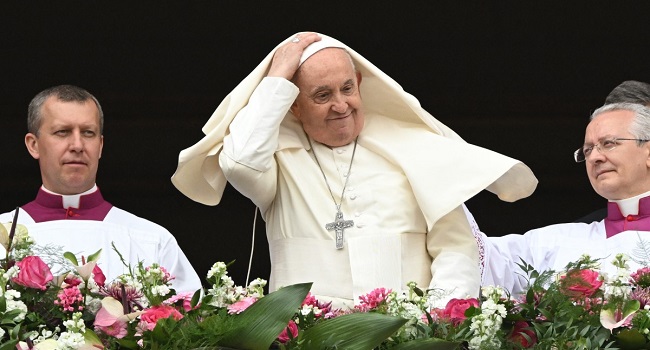Worship
Pope Francis is dead; His real name, others revealed

Pope Francis assumed the papacy in 2013 following the resignation of Pope Benedict XVI. He was known for his action on climate change and being critical of consumerism
Beloved Pope Francis has died after spending his entire life “dedicated to the service to the Church”, the Vatican has confirmed.
Cardinal Kevin Ferrell, the Vatican camerlengo, announced the sad news the Pope passed away at around 7.30am. The 88-year-old was admitted to the Gemelli hospital in Rome for treatment for bronchitis on February 14, after he had difficulties breathing during one of his meetings.
As a result of his hospitalisation, the pontiff’s events were subsequently cancelled. Since he was taken to the hospital, the Vatican released regular updates on his condition.
Cardinal Ferrell said in a statement. “At 7:35 this morning, the Bishop of Rome, Francis, returned to the home of the Father. His entire life was dedicated to the service of the Lord and of his Church.”
Pope Francis, whose birth name was Jorge Mario Bergoglio, was born in Buenos Aires, Argentina, on December 17, 1936. At high school, he earned a chemical technician’s diploma before entering the Jesuit novitiate in March 1958.
He became a Catholic priest in 1969. Four years later, he was appointed superior of the Jesuit province of Argentina. In 1992, Pope John Paul II – who was pope from 1978 until his death in 2005 – named him an auxiliary bishop of Buenos Aires and then in 1997, he was promoted to coadjutor archbishop. He became head of the archdiocese in 1998 and three years later, Pope John Paul II named him to the College of Cardinals.
On March 13, 2013, he became pope at the age of 76, succeeding Pope Benedict XVI, the first pope in 600 years to resign from office. In his February 2013 announcement, Pope Benedict, who was 85, said the modern world was changing so quickly and profoundly that someone of his age and era was “no longer suited” to the papacy.
Bergoglio – the first Jesuit pope and the first to take the name Francis – was considered a modern pope, as he advocated for progressive issues and worked to reform the Catholic Church. Some of the issues he had at heart and addressed in his role as Pontiff included climate change, human rights, immigration, modern slavery and LGBTQ+ rights.
He travelled widely across the world, mostly to areas where there are few Catholics and they feel marginalised. His first trip outside of Rome was to the Italian island of Lampedusa, off the coast of Tunisia, which is considered the gateway to Europe for hundreds of thousands of migrants making the perilous sea crossing on the Mediterranean Sea. During his visit, Francis attacked what he described as the “globalisation of indifference” that leads to tragedies like the deaths of refugees who perish while seeking a better future.
The Pope also promoted outreach to other religions and pushed for the Church to improve its dialogue with Islam. He said: “Sincere and respectful dialogue between Christians and Muslims is a duty for us who want to obey the will of God.”
With his critique of capitalism and his staunch environmentalism, Francis angered many conservatives inside and outside the Catholic Church. During a visit to Bolivia in 2015, he gave a speech saying that behind the harm being done to the environment is what he called the “dung of the devil, the unfettered pursuit of money”. The Pope said: “Once capital becomes an idol and guides people’s decisions, once greed for money presides over the entire socio-economic system, it ruins society, it sets people against one another, it even puts at risk our common home, our sister mother Earth.”
While visiting Mexico, he famously prayed at the US border. On his flight back to Rome, the Pope was asked about Donald Trump’s position to build a wall along the border and replied: “A person who only builds walls and not bridges is not Christian.”
Francis also called for the Catholic Church to implement a more welcoming approach to divorced people, saying they may be able to receive communion in certain circumstances. Part of his legacy will undoubtedly remain his approach towards the LGBTQ+ community.
When asked about gay priests during a spontaneous exchange with the press, he replied: “If they [gay priests] accept the Lord and have goodwill, who am I to judge them? They shouldn’t be marginalised. The tendency [same-sex attraction] is not the problem… they’re our brothers.”
In 2023, the Pope formally approved letting Catholic priests bless same-sex couples, a radical shift in policy that aimed at making the Church more inclusive while maintaining its strict ban on gay marriage. Sharing his support for civil unions, Francis said: “I support civil unions. Homosexual people have the right to a family.” He added: “They are children of God and have the right to a family. No one should be ousted or made miserable because of this.”
Before his health took a turn for the worse, Pope Francis issued a rebuke of US Vice President JD Vance’s characterisation of Ordo Amoris – a theological concept relating to love used by Vance to justify Trump’s migrant policy, including mass deportations. His pushback caused fury from the White House, raising the prospect of a highly politicised succession battle following the Pope’s death.
Pope Francis also sent a message of support to Ukraine from his hospital bed, as he delivered his regular Sunday message. In the message, shared by The Vatican, he also thanked his doctors for their care and well-wishers for their prayers. And in a poignant reference to Ukraine following US President Donald Trump ’s bust-up with Ukraine’s President Volodymyr Zelensky in The Oval office, the Holy Father said: “From here, war appears even more absurd,” he said, adding: “Let us pray for tormented Ukraine, Palestine, Israel, Lebanon, Myanmar, Sudan and Kivu.”






![Anxiety as Arik Aircraft Engine Explodes Mid-Air [PHOTO]](https://thepapers.ng/wp-content/uploads/2026/01/breaking-news-80x80.jpg)






